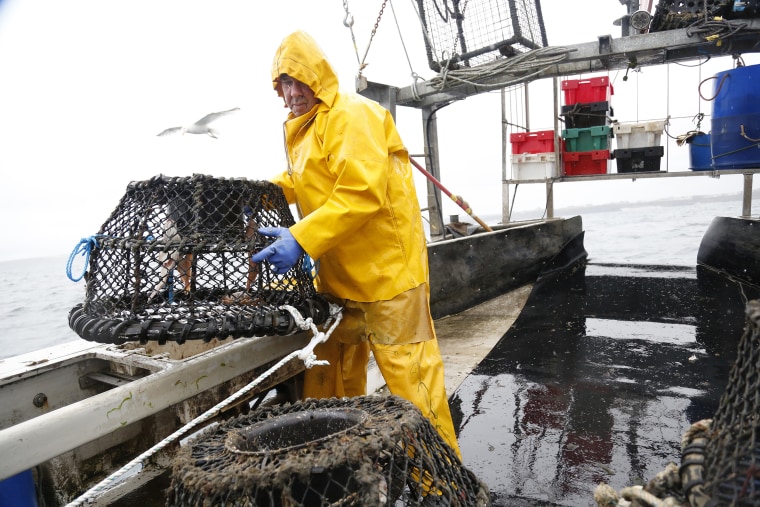NEWQUAY, England — Fisherman Phil Trebilcock is tired of being told there are not enough fish in the sea.
“On the east coast of Cornwall there are fish swimming up the beaches but they’re not allowed to catch them,” he said, hauling pots of spider crabs out of a choppy Celtic Sea recently. “They should take more advice from the fishermen, and less from the scientists.”
Trebilcock is bridling against European Union quotas that dictate how much fish British vessels can land — in some cases prompting fishermen to dump dead fish back into the water if they have caught more than they are allocated.
And that's not all. The fisherman ticked off his grievances with the EU regulations: quotas, too much paperwork and too many foreign boats chasing fish in British waters.
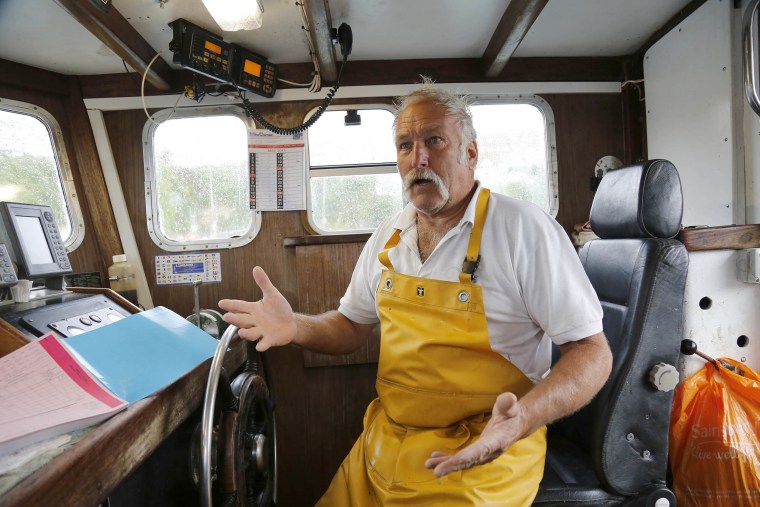
So it is no surprise that last year Trebilcock joined 52 percent of the voting public to chose to leave the EU, or "Brexit."
The country fishing industry accounts for less than 0.5 percent of Britain’s GDP but has nevertheless become a symbol of resistance to what many believe are onerous and damaging EU regulations. So as negotiations between the U.K. and EU ramp up in the coming months, one of the many sticking points will be around shared waters.
In spite of the iconic place that fishermen have within the Brexit camp, the industry is actually divided. While many of those who do the catching are cheering the move, a good number of those who process the catch are fretting over the upcoming divorce.
“We have more to lose from Brexit than to gain from it, definitely,” said Julian Harvey, a partner at W. Harvey and Sons, a shellfish wholesaler and processor in Cornwall on the southwest coast of England.
“We had a tremendous amount of support from the population because after all we’re an island and fishing is part of our heritage.”
Harvey's company exports 70 percent of its produce to the EU, and he worries that the market will shrink after Brexit because of the introduction of trade tariffs. As a member of the European Union Britain is currently part of the EU's single market — which allows for the free movement of goods, services, capital and labor.
“The implications could be huge," Harvey added.
In spite of processors' concerns, the grievances of fishermen have dominated the agenda. It is government policy that once it leaves the EU, Britain intends to take back control of its fisheries, set its own quotas and control foreign access to U.K. waters.
Attempts to take back control are on the horizon.
Since the 1970s, the Common Fisheries Policy has stipulated where British vessels can operate and how much fish they can catch. It has also allowed other EU boats to fish in what Britain sees as its territorial waters.
In June the government said Britain would withdraw from a separate longstanding agreement that allows Irish, Dutch, French, German and Belgian vessels to fish within six and 12 nautical miles of the U.K. coastline.
Among fishermen unloading their daily catch in Plymouth — the port from which the Mayflower set sail for America in 1620 — these changes couldn't come soon enough.
Ryan Simmonds is sick of competing for fish with foreign boats.
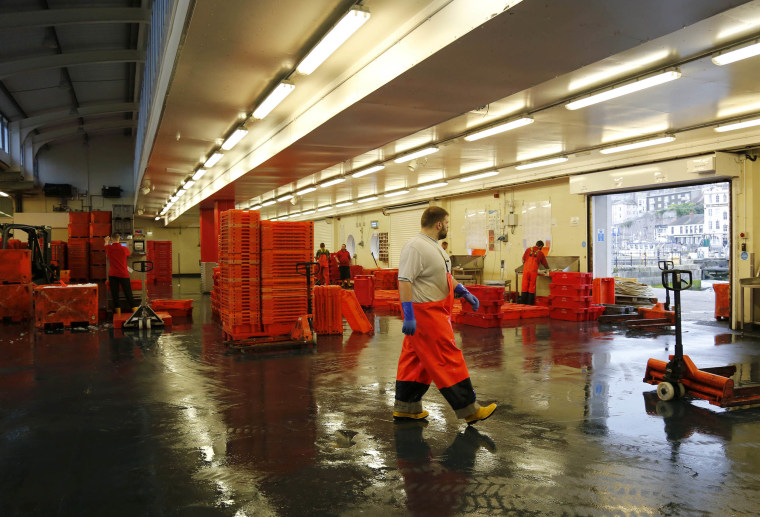
“They come here, plow through our nets, ruining all our gear. Even if you radio them to say where your nets are, they just ignore you,” he said standing in his small fishing boat, The Lady Sovereign, waiting for a processor to come and pick up his catch on a balmy summer evening.
Kurtis Martin, who was chatting with Simmonds, was more explicit.
“They come here and rape our fish,” he said. “We have tiny quotas and have to play by the rules and they come here with their massive quotas and take what they want.”
The 22-year-old fishermen said the legislation was crippling. “It’s crazy and you have to play by the book. They enforce it and you end up throwing dead fish back into the sea."
Related: Fear and Loathing in the U.K.'s Answer to Trump's Rust Belt
According to U.K. government data, there is an imbalance in the amount of fish caught by British and EU vessels in each other’s waters. In 2015, EU vessels caught 683,000 tons of fish in U.K. waters, while British vessels caught only 111,000 in EU member states’ seas.
Trebilcock, who has fished off the west coast of Cornwall for over 40 years, says he is hopeful Brexit will change things.
“We need to take back a bit of control,” he said tugging on his black and yellow beanie hat — the traditional colors of Cornwall.
Healthy fish stocks
While fishermen often rail against environmental regulations that limit their catches, economist Griffin Carpenter said European quotas had allowed fish stocks to replenish after falling to dangerously low levels.
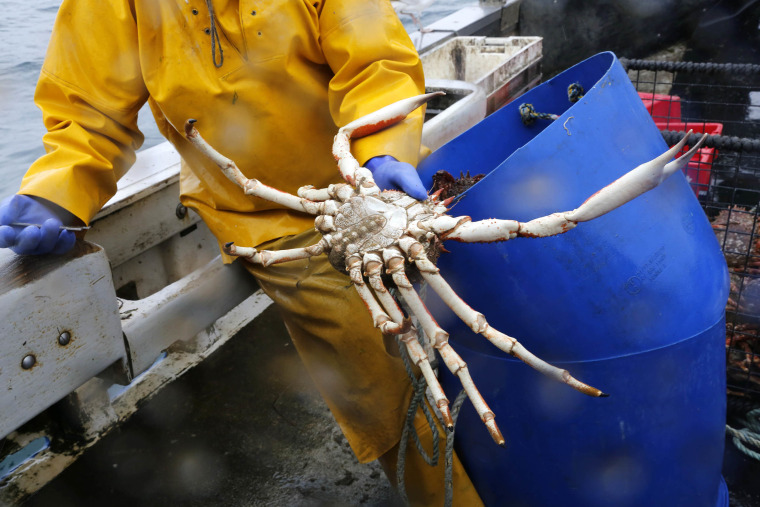
“The U.K. is in a healthier state that it has been in decades, and largely that’s due to EU management... EU fish stocks are increasing right now,” said Carpenter. “The EU’s had to make hard decisions about fishing quotas… and there is a concern that we might be leaving the EU and the Common Fisheries Policy as soon as things are getting good.”
He admitted there were problems surrounding quotas, but the British government shared the blame with the EU for the poor implementation.
While more than 75 percent of the British fishing fleet is made up of small-scale vessels, they only hold 1.5 percent of the overall quota, according to data compiled by Carpenter. This helps explain, he said, why many small fishermen were struggling to get by.
However, Brexit won't help these fishing businesses, said Carpenter.
“That’s the greatest inequity in U.K. fisheries and Brexit is set to further this divide,” he said, explaining that he thought the large vessels would “gobble up” the possible quota gains after Brexit.
Cod Wars
The U.K. has already seen how negotiations over fisheries can quickly turn into full-blown confrontations.
During the 1970s, relations between the U.K. and Iceland rapidly deteriorated over access to cod stocks in the North Atlantic. At the height of the so-called Cod Wars, the British Royal Navy was deployed to protect U.K. trawlers as they fished in disputed waters.
Related: EU Citizens Fear the Future Amid Questions, Backlash
There were several reports of vessels ramming into other boats, and in one instance, in 1975, an Icelandic gunboat opened fire at unarmed British fishery support vessels. NATO was eventually called to resolve the dispute.
For Dave Pessell, the Managing Director of Plymouth Trawler Agents, a fish auctioneering business, fishing has attracted significant attention in the Brexit debate because it forms part of Britain’s fabric as an island nation.
“Emotionally we had a tremendous amount of support from the population because after all we’re an island and fishing is part of our heritage,” he said.
But for many wholesalers, processors, suppliers and restaurateurs, the prospect of leaving the single market and the introduction of tariffs is daunting.
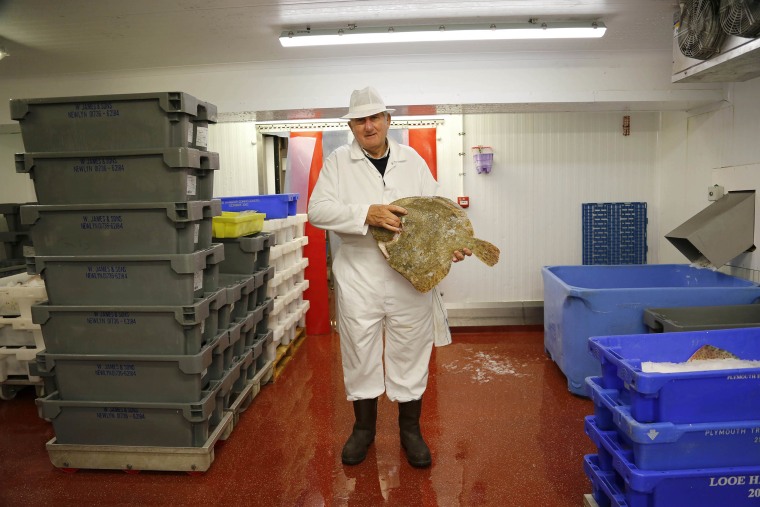
Britain currently exports the majority of the fish it catches, with 50 percent of the catch exported tariff-free because of its membership to the European Union.
Other than tariffs, processors are concerned they won't be able to hire European workers. For example, some 60 percent of shellfish wholesaler and processor W. Harvey and Sons' staff comes from the European Union. The weakness of the pound following the Brexit vote has also meant packaging and energy bought from the EU is more expensive, and the uncertainty is bad for business.
For Matthew Stevens, a producer and supplier in the fishing town of St. Ives in southwest Cornwall, EU grants amounting to between £500,000 to £600,000 ($655,740 to $786,888) in the last 15 years have allowed him to expand from a small seller employing five people, into a processing operation with a team of 90.
“It’s encouraged the likes of me to expand my business and create wealth and jobs locally, and that’s the whole idea of EU funding,” said Stevens, who voted remain in the EU.
The 72-year-old worries that the grants he currently receives from the EU won't be made up by the British government, in spite of official promises.
“Our government says they’ll do it, but how can they?” he said.
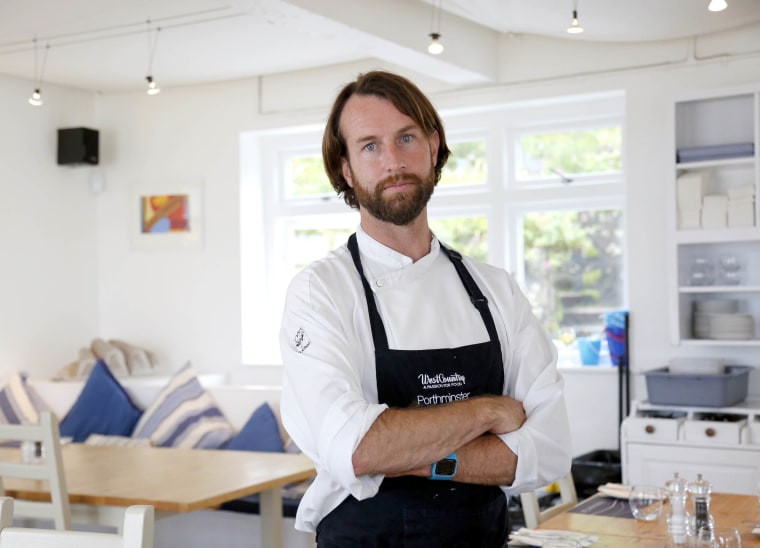
Michael Smith, a restaurateur in the picturesque seaside town who buys his fish from Stevens, also worries that Brexit would drive up his costs.
“More than 50 percent of my staff are European and I’m looking for more people all the time. If they can’t stay, my costs are going to go up,” he said from his beach-side restaurant.
He added: “Fishermen might be able to catch more fish but how are we going to get it to the plate?”
